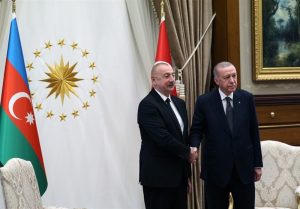PNN – The famous Turkish diplomat believes that if the country is not allowed to participate in regional and trans-regional games, it can easily ruin the game.
According to the report of Pakistan News Network, following the developments in Syria, Turkish government and ruling party officials are speaking with more confidence about Ankara’s role in balances and equations. They even sometimes exaggerate, considering Turkey as an actor that influences major games on a par with the great powers of the world and the region.
Not long ago, before Donald Trump’s trip to Middle Eastern countries, many analysts close to the Erdogan government claimed that Trump would also visit Ankara and that in his new term of office, the friendship and special relationship between Erdogan and Trump would solve many problems.

Analysts close to the AK Party even claimed that Erdogan, through his interaction and friendship with Trump, would resolve problems such as the Russia-Ukraine war and clarify the situation in Gaza in the medium term. But this did not happen, and Turkey still has many problems in choosing an appropriate axis of movement for interaction and balance between East and West.
For this reason, some Turkish diplomats and foreign policy experts openly suggest that Turkey should either change the game when necessary or use various cards and tools to play a role in the hostage situation.
Mehmet Ogutcu, a former diplomat at the Ministry of Foreign Affairs and current director of the Energy Institute in London, addressed this issue in an analytical note:
Where is Türkiye in the game?
When we look at the world’s diplomacy, we see that politicians from some countries are around the table, some are on the list and are scheduled to be met, some are making the game, and some are breaking the game even if they are never invited.
Turkey is now in the last category, becoming a player that changes the outcome even if it is not included in the game, and a player that must accept the consequences even if someone tries to remove it.
Of course, this is not just the result of the government’s official diplomatic efforts. The MIT intelligence service, which has been Türkiye’s invisible but effective force in the field in recent years, is one of the most important architects of this transformation.
With the strategic transition of the Middle East from a defensive strategy to a proactive one, Türkiye now stands out with its military and security role in unexpected geographies, equations, and alliances.
Türkiye’s return to the Eastern Mediterranean
The Eastern Mediterranean situation is one of Turkey’s symbolic actions to participate in the balance. Turkey was not invited to the Eastern Mediterranean Gas Forum (EMGF), which was established in 2019. The coalition of Greece, Cyprus, Israel, Egypt and the European Union tried to exclude Turkey from the dynamics of regional developments. This exclusionary strategy seemed to isolate Turkey in the short term, but in the long term, it did not and weakened the game makers themselves.
Why? For these reasons:
Pipeline projects will not be financed without Türkiye’s presence, and investors are afraid.
Energy diplomacy cannot be transformed into regional security architecture.
As most corridors and alternative routes become politicized, efficiency decreases.

The attempt to restore Turkish-Israeli relations, which were severed after the Gaza tragedies, through Azerbaijan, the renewal of relations with Egypt, the mediation role of Qatar, Syria’s return to the game, and Europe’s search for new energy security show that excluding Ankara from the regional games is not a sustainable move.
Of course, there are other examples that can simply show that Türkiye can challenge a game if it does not join it:
Libya: The support provided to the Tripoli government through the coordination of Turkish airstrikes and drones stopped Haftar’s advance and the equation in Libya was reversed. Now that the game has changed, Ankara has now started cooperating with Haftar. It has become clear that continuing the game without Türkiye in Libya is not possible.
Azerbaijan – Armenia: The Republic of Azerbaijan received not only military support from Turkey, but also strategic intelligence and advice, and won the Karabakh war in 2020. With Turkey’s mediation, Russia was convinced, and countries such as France, which were present in the Minsk process, were left out of the game.
Russia – Ukraine: Ankara’s behind-the-scenes diplomacy in sensitive processes such as the grain corridor and prisoner exchange made Turkey an important mediator.
Africa: Cooperation with Somalia is developing not only in the military sphere, but also in the areas of energy and economic cooperation. Turkey has weakened French influence in countries such as Niger, Chad and Burkina Faso with its MIT activities, security advice, humanitarian aid and training. Turkish entrepreneurs are also trying to counter China in the field.

A place to mess up the game
Sometimes you may have to break the game instead of making it.
Iraq and Syria: Targeted neutralization operations against PKK and YPG elements have led to the collapse of these organizations. It is almost impossible to advance a major game in Iraq and Syria without Ankara’s participation. With this support on the ground, the game of creating Kurdish federalism is being neutralized and diplomacy continues.
Hamas: Although Türkiye’s close relationship with Hamas seems to keep Ankara out of the Gaza equation for now, its influence was used in the process of convincing Hamas to accept a ceasefire with Israel.
Sweden and Finland: In the process of NATO expansion after the Russia-Ukraine war, Finland and Sweden were not accepted without meeting Türkiye’s demands. Here too, Ankara used its ability to break the deadlock and achieved results.
Today, Türkiye may not be invited to some tables. But when that table is overturned or the solution reaches a deadlock, Ankara is the first to be contacted.

